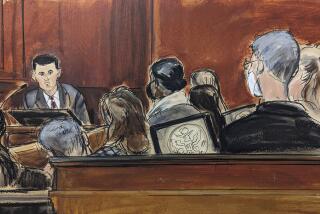Two former Citigroup executives apologize for crisis and bailout
- Share via
Reporting from Washington — Two former top Citigroup Inc. executives apologized Thursday for the financial crisis and the $45-billion public bailout needed to save the banking giant from collapse. But Democrats and Republicans ripped the executives for not taking any responsibility for the company’s dramatic fall and the nation’s fiscal morass.
“I’m sorry that the financial crisis has had such a devastating impact on our country. I’m sorry for the millions of people, average Americans who have lost their homes,” Charles “Chuck” Prince, Citigroup’s chief executive from 2003 to 2007, told the commission investigating the crisis.
“And I’m sorry that our management team, starting with me, like so many others, could not see the unprecedented market collapse that lay before us,” he said.
Prince’s apology came on the second of three days of hearings by the Financial Crisis Inquiry Commission into the subprime mortgage meltdown. He was followed by former Citigroup Chairman Robert Rubin, who expressed regret for the failure of himself and others to see the approaching turmoil.
“Almost all of us in the financial system -- including financial firms, regulators, rating agencies, analysts and commentators -- missed the powerful combination of forces at work and the serious possibility of a massive crisis,” said Rubin, who served as Treasury secretary under President Clinton.
“We all bear responsibility for not recognizing this, and I deeply regret that,” he said.
But neither Prince nor Rubin would take responsibility for the huge losses that nearly drove Citigroup into bankruptcy. They said they weren’t aware until fall 2007 of the high risks of the mortgage-backed assets the company was holding, and they largely blamed Citi’s problems on a confluence of outside market forces.
Democrats and Republicans on the panel ripped the two executives for diverting blame.
“At the end of the day, the two of you in charge of the organization did not seem to have a grip on what was happening,” said commission Chairman Phil Angelides, a Democratic appointee.
“I’m not so sure apologies are as important as assessment of responsibility. . . . Instead of asking, ‘What did you know and when did you know it?’ I should be asking, ‘What didn’t you know and why didn’t you know it?’ ” he said.
The panel’s vice chairman, Bill Thomas, a Republican appointee, slammed Prince and Rubin for not returning any of the tens of millions of dollars in compensation they received before Citigroup’s fall. He said a “simple apology” isn’t enough, “no matter how often you feel really, really sad.”
Commission members went easier on the current and former head of one of Citigroup’s regulators, the Office of the Comptroller of the Currency. That agency only oversaw Citigroup’s national banking division, Citibank, which did not have as many problems as the rest of the huge multinational firm.
Comptroller John C. Dugan said the agency could have better supervised the banks, but the regulator had raised concerns with Citigroup officials starting in 2005 that its growth was taking precedence over controlling risk-taking.
Citigroup has been the most contrite of the firms that received a major bailout and, because of the large amount of assistance it received, has been a major focus of lawmakers and the panel investigating the crisis.
Last month, Chief Executive Vikram Pandit publicly thanked taxpayers for their aid. Citigroup in December repaid $20 billion of the $45-billion bailout. The remaining money was converted into a government ownership stake, which Treasury officials said last week they intended to sell.
Prince said risk assessments by Citigroup on about $40 billion of highly rated securities based on subprime mortgages turned out to be “dramatically wrong.” But he said he could not fault company employees for acquiring those assets because they came with the highest credit ratings.
“Having $40 billion of AAA-plus-rated paper on the balance sheet of a $2-trillion company would typically not raise a concern,” Prince said.
But the value of those assets began deteriorating amid the collapse of the housing market. Prince resigned Nov. 4, 2007, after Citigroup announced $8 billion to $11 billion in write-downs for those investments, which ultimately cost the company $30 billion.
Also Wednesday, Richard Bowen, the former chief underwriter of CitiMortgage Inc., testified that he began warning company officials in 2006 about the risks being taken with securities backed by subprime mortgages. He sent an e-mail Nov. 3, 2007, to Rubin and other top officials warning of “significant but possibly unrecognized financial losses.”
Rubin said Thursday that he referred the e-mail to the appropriate company officials and that it “was acted on promptly.” Angelides asked Rubin to submit details on who acted on it and how.
jim.puzzanghera
@latimes.com
More to Read
Inside the business of entertainment
The Wide Shot brings you news, analysis and insights on everything from streaming wars to production — and what it all means for the future.
You may occasionally receive promotional content from the Los Angeles Times.











